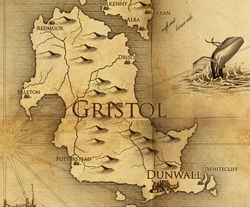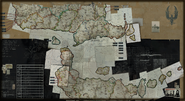
Gristol, as drawn on a cartographer's map.
Gristol is a large island, known for its rolling green hills and foggy meadows,[1] that is centrally located within the Isles and is the imperial center of the Empire of the Isles.
The island of Gristol is home to half the population of the Isles[1] and contains eight major cities: Baleton, Driscol, Dunwall, Old Lamprow, Poolwick, Potterstead, Redmoor, and Whitecliff. Gristol's massive capital city of Dunwall has become a bleak place due to the course of events leading up to the beginning of Dishonored, and serves as the primary locale for the game.
Industry and Trade
While the nation's economy was originally based in fishing and whaling, whale oil processing techniques invented by Esmond Roseburrow, and technological advancements pioneered by Anton Sokolov, gave rise to a fully-realized industrial revolution. Gristol is referred to as the "heart of industry" within the Isles,[citation needed] and several major production companies (such as Greaves Lightning Oil) are based there.
The island is mostly rural. Outside of the city, sheep, blood oxen, and gazelle are raised for their hides and meat, and many large mines, owned by various influential families, can be found scattered about the island.[1] Known contents of these mines include silver and a special crystal used to make rat lights.
Culture
A hearty folk, fond of sheep pies, fish dishes, and beer, Gristolians are described as "merry" and "hard-working". The Imperial Navy has much prestige among the population, and some families continue the tradition of enlisting at least one boy from each generation.[1]
Dunwall is known for its wide hierarchical class divides, perhaps exacerbated by the rat plague. Institutions such as the Rudshore Financial District seemed to guarantee economic stability for regular citizens of Dunwall, but with the coming of the plague, divides between classes and cultures became much wider. The lower classes in Dunwall are notably pragmatic (and superstitious, according to a note by High Artificer Bartholomew, though the source may not be reliable), while the upper echelon, composed largely of hereditary nobility, seems to be based on a culture of excess. Whether these practices can be attributed to other cities within Gristol, or are unique to Dunwall, is unknown.
Additionally, the culture seems to espouse restrictive attitudes toward gender, sexuality, and religion; women are barred from certain occupations and homosexuality is regarded as taboo- at least among Overseers. In addition, adherence to the laws of the Abbey of the Everyman is widely enforced, and the Abbey itself was formed in Gristol during the Siege of White Cliff. The faithful congregate weekly and attend sermons given by Overseers, as well as participating in all major holidays.[1]
The people of Gristol also participate in the Fugue Feast.
International Relations
The heart of the Empire, Gristol has historically managed to expand its influence over the Isles due to its powerful navy. It is often said that young boys coming of age often travel to Gristol in order to learn the art of naval combat.[citation needed] This notable strength has been further compounded in recent times through innovations in naval technology, particularly the designs of Anton Sokolov.
Trivia
- Gristol is apparently based on countries of Western Europe, such as England (not all Britain), France, the Low Countries and Germany.[citation needed]
- The name Gristol is likely based on Bristol, a county and city of the UK.[citation needed]
Gallery
References
World of the Dishonored franchise | |
|---|---|
| Geography |
The Isles (Gristol • Morley • Serkonos • Tyvia) • Dunwall • Karnaca • Pandyssian Continent |
| History |
The Loyalist Conspiracy • Rat Plague • Siege of White Cliff • Timeline • The Great Burning |
| Beliefs | |
| Authority |
City Watch • Empire of the Isles • Grand Guard • Warfare Overseers |
| Science | |
| Documents | |

